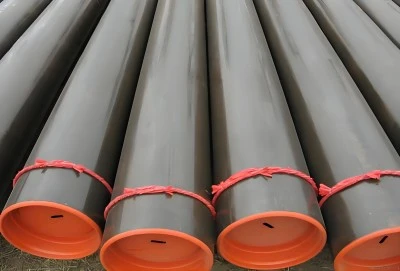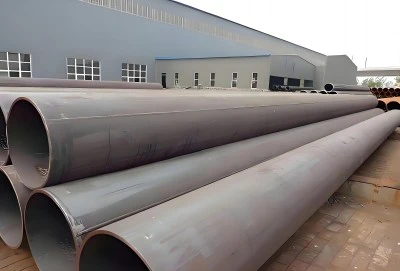In the oil and gas industry, the quality and reliability of pipeline materials are paramount. Among the various types of pipes used, API 5L X80 pipe stands out for its superior strength and performance in demanding environments. But how do manufacturers ensure that these pipes meet the stringent quality standards required for critical applications? Let's delve into the comprehensive testing procedures that guarantee the excellence of API 5L X80 pipes.
|
|
|
API 5L X80 Pipe Standards
Before we explore the testing procedures, it's essential to understand what sets API 5L X80 pipes apart. These high-grade steel pipes are manufactured according to the American Petroleum Institute's 5L specification, with "X80" designating a minimum yield strength of 80,000 psi (551 MPa). This strength level makes them ideal for high-pressure pipelines in challenging terrains and offshore applications.
The API 5L standard establishes two product specification levels: PSL1 and PSL2. While both levels ensure high-quality pipes, PSL2 imposes additional testing requirements and stricter controls on chemical composition and mechanical properties. For X80 grade pipes, PSL2 is more commonly specified due to the demanding nature of their applications.
Non-Destructive Testing (NDT) for API 5L X80 Pipes
Non-destructive testing is a crucial aspect of quality assurance for API 5L X80 pipes. These methods allow manufacturers to inspect pipes thoroughly without compromising their structural integrity. The primary NDT methods employed include:
1. Ultrasonic Testing (UT): This method uses high-frequency sound waves to detect internal flaws, measure wall thickness, and identify potential weak points in the pipe. For API 5L X80 pipes, automated ultrasonic testing is often used to ensure 100% coverage of the pipe body and weld seams.
2. Radiographic Testing (RT): X-rays or gamma rays are used to create images of the pipe's internal structure, revealing defects such as porosity, inclusions, or incomplete fusion in welds. RT is particularly useful for examining thick-walled X80 pipes where ultrasonic penetration might be limited.
3. Magnetic Particle Inspection (MPI): This method is used to detect surface and near-surface defects in ferromagnetic materials. For X80 pipes, MPI is often applied to inspect the pipe ends and any repairs made during manufacturing.
4. Eddy Current Testing: This electromagnetic technique is used to detect surface and near-surface flaws, as well as to verify the heat treatment of X80 pipes.
These NDT methods are typically performed in accordance with internationally recognized standards such as ASTM E213 for ultrasonic testing and ASTM E94 for radiographic testing.
Mechanical Property Tests for API 5L X80 Pipe
While non-destructive tests ensure the structural integrity of API 5L X80 pipes, mechanical property tests verify that the pipes meet the specified strength and toughness requirements. These tests include:
1. Tensile Testing: Samples from the pipe body and weld seam are subjected to tensile forces to determine yield strength, tensile strength, and elongation. For X80 pipes, the minimum yield strength should be 555 MPa (80,500 psi), with a tensile strength range of 625-825 MPa (90,600-119,600 psi).
2. Charpy V-Notch Impact Testing: This test measures the toughness of the material at specified temperatures. For X80 pipes, the impact energy requirements are typically higher than for lower grade pipes, ensuring better resistance to brittle fracture in harsh environments.
3. Hardness Testing: Vickers or Rockwell hardness tests are performed to ensure consistent material properties across the pipe body and weld areas.
4. Flattening Test: This test assesses the ductility and weld integrity of the pipe by flattening a ring cut from the pipe end until a specified height is reached.
5. Guided Bend Test: For welded pipes, this test evaluates the ductility and soundness of the weld by bending a sample to a prescribed curvature.
6. Drop Weight Tear Test (DWTT): This test is crucial for X80 pipes used in low-temperature environments, as it assesses the resistance to brittle fracture propagation.
All these tests are conducted in accordance with the requirements set forth in the API 5L specification and related standards such as ASTM A370 for mechanical testing of steel products.
In addition to these standard tests, API 5L X80 pipes may undergo specialized tests depending on their intended application. For instance, pipes destined for sour service environments may be subjected to hydrogen-induced cracking (HIC) tests and sulfide stress cracking (SSC) tests to ensure their resistance to these specific types of corrosion.
The manufacturing process for API 5L X80 pipes also involves strict quality control measures. This includes careful control of the chemical composition, with particular attention paid to elements like carbon, manganese, and microalloying elements such as niobium and vanadium. The heat treatment process, typically involving carefully controlled quenching and tempering, is crucial for achieving the desired microstructure and mechanical properties.
Moreover, dimensional tolerances are tightly controlled and verified throughout the manufacturing process. This includes checks on outer diameter, wall thickness, straightness, and end squareness. These dimensional checks ensure that the pipes will fit together properly during pipeline construction and maintain their structural integrity under operational pressures.
It's worth noting that the testing procedures for API 5L X80 pipes are not just about meeting minimum standards. Many manufacturers and end-users specify additional requirements beyond the API 5L standard to ensure even higher levels of quality and reliability. This might include more stringent limits on chemical composition, tighter tolerances on mechanical properties, or additional specialized tests.
The comprehensive nature of these testing procedures underscores the critical importance of quality in pipeline materials. For API 5L X80 pipes, which are often used in high-stakes applications where failure could have severe consequences, these rigorous quality assurance measures are essential. They provide confidence to pipeline operators, regulatory bodies, and the public that these pipelines are built to withstand the demanding conditions they will face over their operational lifetime.
API 5L X80 Pipes Manufacturer
The testing procedures for API 5L X80 pipes are comprehensive and rigorous, reflecting the critical nature of their applications in the oil and gas industry. From non-destructive testing methods that ensure structural integrity to mechanical property tests that verify strength and toughness, every aspect of these pipes is scrutinized to meet and exceed industry standards.
At Longma Group, we understand the importance of these quality assurance measures. As a leading manufacturer of API 5L X80 pipes, we employ state-of-the-art testing equipment and adhere to the strictest quality control procedures. Our commitment to excellence ensures that every pipe we produce meets the highest standards of quality and reliability.
If you're looking for API 5L X80 pipes that you can trust for your critical pipeline projects, look no further. Contact us today at info@longma-group.com to learn more about our products and how we can meet your specific needs. Let Longma Group be your partner in building safe, efficient, and durable pipeline infrastructure.














